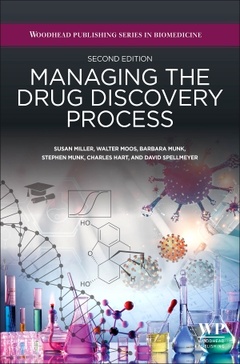Description
Managing the Drug Discovery Process (2nd Ed.)
Insights and advice for students, educators, and practitioners
Authors: Miller Susan, Moos Walter, Munk Barbara, Munk Stephen, Hart Charles, Spellmeyer David
Language: English
220.63 €
In Print (Delivery period: 14 days).
Add to cart682 p. · 15.2x22.8 cm · Paperback
Description
/li>Contents
/li>Biography
/li>Comment
/li>
Managing the Drug Discovery Process, Second Edition thoroughly examines the current state of pharmaceutical research and development by providing experienced perspectives on biomedical research, drug hunting and innovation, including the requisite educational paths that enable students to chart a career path in this field. The book also considers the interplay of stakeholders, consumers, and drug firms with respect to a myriad of factors. Since drug research can be a high-risk, high-payoff industry, it is important to students and researchers to understand how to effectively and strategically manage both their careers and the drug discovery process.
This new edition takes a closer look at the challenges and opportunities for new medicines and examines not only the current research milieu that will deliver novel therapies, but also how the latest discoveries can be deployed to ensure a robust healthcare and pharmacoeconomic future. All chapters have been revised and expanded with new discussions on remarkable advances including CRISPR and the latest gene therapies, RNA-based technologies being deployed as vaccines as well as therapeutics, checkpoint inhibitors and CAR-T approaches that cure cancer, diagnostics and medical devices, entrepreneurship, and AI. Written in an engaging manner and including memorable insights, this book is aimed at anyone interested in helping to save countless more lives through science. A valuable and compelling resource, this is a must-read for all students, educators, practitioners, and researchers at large?indeed, anyone who touches this critical sphere of global impact?in and around academia and the biotechnology/pharmaceutical industry.
Section A: Introduction and Overview
1. Backgrounder—Part 1
2. Backgrounder—Part 2
Section B: Preprofessional Education
3. Introduction: Preprofessional education
4. Two-year certification and degree programs
5. Four-year undergraduate degree programs
6. The big decision
Section C: Graduate and Professional Education
7. Graduate and postgraduate education at a crossroads
8. Master’s degree programs
9. Doctoral and professional programs
10. The big leap
Section D: Research and Discovery
11. Drug discovery: Standing on the shoulders of giants
12. Drug discovery processes: When and where the rubber meets the road
13. Drug discovery: Chaos can be your friend or your enemy
14. Research and discovery: Essential partners but just a start
Section E: Chemical, Biological, and Healthcare Product Development, Quality Requirements, and Regulatory Affairs
15. Turning a potent agent—a chemical "drug"—into a registered product
16. Chemical development: Synthetic studies and engineering including aspects of batch production and continuous processing
17. Chemical development: Analytical studies
18. FDA path and process: Sponsor’s regulatory tasks for drug approval
19. Development of biological and other healthcare products
Section F: Pharmaceutical Research and Development: Concluding Remarks
20. Epilogue
Walter Moos has been an adjunct Professor of Pharmaceutical Chemistry at the University of California San Francisco (UCSF) since 1992. In parallel, he has been Managing Director of Pandect Bioventures, which he co-founded in 2018. At S
- Considers drug discovery in multiple R&D venues - big pharma, large biotech, start-up ventures, academia, and nonprofit research institutes - with a clear description of the degrees and training that will prepare students well for a career in this arena
- Analyzes the organization of pharmaceutical R&D, taking into account human resources considerations like recruitment and configuration, management of discovery and development processes, and the coordination of internal research within, and beyond, the organization, including outsourced work
- Presents a consistent, well-connected, and logical dialogue that readers will find both comprehensive and approachable
- Addresses new areas such as CRISPR gene editing technologies and RNA-based drugs and vaccines, personalized medicine and ethical and moral issues, AI/machine learning and other in silico approaches, as well as completely updating all chapters




